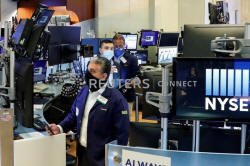Funds recommended cutting equity exposure in May to lowest level this
year
 Send a link to a friend
Send a link to a friend
 [May 28, 2021] By
Tushar Goenka [May 28, 2021] By
Tushar Goenka
BENGALURU (Reuters) - Funds recommended the
lowest equity exposure this year in May, citing risks from the expected
pull-and-push between reflation trades and dovish central banks, but
most respondents in Reuters polls said a near-term correction in stock
markets was unlikely.
While global shares have see-sawed in May, with technology-related
stocks taking a hit, the MSCI world equity index breached an all-time
high and European bourses were near record highs, helped by policymakers
allaying inflation concerns.
Still, Reuters polls of 35 fund managers and chief investment officers
in the United States, Europe and Japan, taken May 10-27, showed the
lowest recommended equity allocations since December - averaging 48.7%
of the model global portfolio, down from over a three year high of 49.8%
last month.
"We have entered an uncertain and riskier environment – volatility is
rising and equity-bond correlation is turning positive. It is important
to stay cautious and lock in some gains in risk assets," said Pascal
Blanqué, group chief investment officer at Amundi, in Paris.

"Equities will do ok in absolute terms as long as inflation is not
breaking the anchored territory. In stocks, investors should seek some
protection against the bursting of the tech bubble. This means being
cautious in interest rate sensitive shares, while preferring dividend
yielding ones."
When asked about the likelihood of a correction in global stocks over
the next three months, 57% of fund managers, or 12 of 21, said it was
unlikely. While the remaining nine said it was likely.
"We still believe that the return potential for equities is skewed to
the upside on a one-year year time horizon," said Craig Hoyda, senior
quantitative analyst at Aberdeen Standard Investments.
"However, as the investment cycle matures, valuations rise and sentiment
improves, prospective returns should steadily diminish."
In response to another question, 70% of 20 asset managers said a hunt
for yield trades would sway financial markets over the next three months
rather than safe-haven bets.
INFLATION
"Many of the factors supporting risky assets are and will remain in
place over the (European) summer. The reopening of economies will
continue to support the recovery in earnings," noted the investment team
at Generali Investments Partners.
"On the other hand, we are aware of the increasing concerns over
inflation and the possible implications on monetary policy. That said,
we rather see these factors causing some volatility and possibly an
acceleration of the rotation theme within equities towards value-exposed
markets/sectors."
[to top of second column] |

Traders wearing masks work, on the first day of in-person trading
since the closure during the outbreak of the coronavirus disease
(COVID-19) on the floor at the New York Stock Exchange (NYSE) in New
York, U.S., May 26, 2020. REUTERS/Brendan McDermid

Echoing those views, findings of a separate Reuters poll of about 300 equity
strategists showed world stocks were predicted to rise modestly this year, with
a near-term correction unlikely.[EPOLL/WRAP]
In the latest polls, all 21 wealth managers in response to another question said
corporate earnings would rise for the rest of the year, including over 65% of
them expecting a significant rise. None predicted company earnings to decline.
"We will see a significant rise in corporate earnings. However, that is unlikely
to be across all sectors but more likely from those that were hurt the most due
to the lockdown," said Peter Lowman, chief investment officer at Investment
Quorum.
"Given we are likely to see a pick up in consumer spending over the next few
months there could be some significant upgrade in earnings for some of those
consumer-led sectors."
Treasury yields were up on Thursday, bolstered by expectations for more debt
issuance following a report which showed U.S. President Joe Biden was likely to
announce a $6 trillion budget, the largest spending since the second world war.
Fund managers suggested an increase to fixed-income allocations to the highest
this year, accounting for 40.3% of the balanced global portfolio, from 39.5% in
the previous month, which was the lowest since February 2019.
While comments from multiple Federal Reserve officials have tried to calm
inflation worries recently, policymakers have also signalled a possible start to
talks to end the central bank's bond buying program.
"Inflation is taking the driver's seat of markets. It is difficult to see
inflation just picking up for a few months and then returning to about 2%
quickly. This is the start of a journey towards a period of higher inflation and
lower growth compared to the current consensus," added Amundi's Blanqué.

"The consensus points to a Goldilocks scenario, buying into the view that this
is a temporary inflation pick up, we think this is a risk. In the end, something
structural is just something temporary that has lasted. Fears of inflation can
become inflation."
(Reporting and Polling by Tushar Goenka in BENGALURU and Fumika Inoue in TOKYO;
Editing by Rahul Karunakar, William Maclean)
[© 2021 Thomson Reuters. All rights
reserved.] Copyright 2021 Reuters. All rights reserved. This material may not be published,
broadcast, rewritten or redistributed.
Thompson Reuters is solely responsible for this content. |